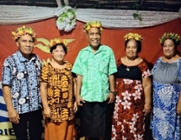Youth in cities dialogue - part one

10 May 2023
CLGF began the first of two online events to discuss Youth in Cities for the Caribbean and Pacific regions, organised in conjunction with the Commonwealth Youth for Sustainable Urbanisation (CSYU) Network. The dialogues sought to share and exchange views on the youth agenda; look at democratic and political inclusion; discuss the issues and challenges that young people feel are important; help city leaders and elected representatives to focus on youth priorities in future planning and decisions and incorporate youth views.
Leaders listening to youth
CLGF Secretary-General Lucy Slack welcomed everyone and provided background. By 2050, it was estimated that half the population of the Commonwealth will live in cities and 60% of this demographic will be aged 30 or under. It is vital to ensure that the future users of services have a say and a role in planning and decision-making for the cities of our future. CLGF established the CSCN or Commonwealth Sustainable Cities Network in 2015 which brings together city leaders and other stakeholders to share ideas and best practices. CLGF then partnered with Commonwealth organisations representing architects, planners and universities to create a Call to Action for sustainable development which asked governments at the Commonwealth Heads of Government Meeting (CHOGM) in 2022 to prioritise urbanisation and sustainable development and encourage collaboration across the stakeholders and professions. The CYSU was launched in 2022 to give young professionals, including elected officials, a platform to air their views, ideas and aspirations.
Think piece on youth
Jane Lumumba, a cities and climate change expert working for KPMG, presented the report she had been commissioned to write on Youth in Cities. The 'think-piece' aimed to understand what city leaders are doing, and can do for young people, looking at the themes of economic, social and democratic inclusion and housing. It sought to look at how capital and secondary cities can benefit from the youth dividend, how to increase youth involvement in democracy, and the variations in these issues across the regions.
Written during Covid, divided into male and female responses, it includes a survey, qualitative and quantitative data and 16 case studies across the main themes. The most pressing issues for youth include: economic hardship, employment and lack of jobs; digitalisation – access to, and support; financial literacy to provide capacity to participate in the local economy; support for youth entrepreneurship; access to credit, which is a problem due to age and therefore impedes ability to start-up and run effective businesses. Other issues of concern relate to young people who get degrees but cannot find employment to match their academic ability; social inclusion and little sense of belonging. The lack of public spaces is linked to mental health problems among young people, and better planning is needed for recreation, leisure and accessing sports and cultural services. There is a stigma attached to mental health issues, exacerbated by Covid, when young people suffered isolation and were unable to interact and the lack of universal health care or access to support systems.
Mutual distrust
There is also a mutual distrust between leaders and young people, who feel their concerns are not heard or taken into consideration. Ageism is a concern with young people feeling they have no way of contributing their views and 40% felt excluded from governance processes. Young people were concerned about homelessness and being able to own their own home. The knock-on effect of the global economy, lack of employment, transitioning from renting to owning a home, rising rents and house costs, which often means young people have to live in unsafe areas, which makes certain groups feel vulnerable, particularly young women, LGBTQ community and immigrants.
Mentoring in Montego Bay
Richard Vernon, Deputy Mayor, City of Montego Bay, Jamaica said local government must be at the heart of SDG11, which relates to creating sustainable cities, and citizen participation, particularly at youth level, is crucial. Youth are specifically involved and elevated via programmes to eliminate poverty and stimulate employment. The Jamaica Youth Council is working on a mentoring programme specifically to close distrust.
Reframing how young people are seen
Sophie Handford was just 18 when she became a councillor with Kapiti Coast District Council, New Zealand and sought to reframe how young people are seen: they are not leaders of tomorrow, but of today with energy, inspiration and insights. The council provides young people with space to develop their skills and obtain a ‘work passport’ to demonstrate their capabilities to prospective employers. Kapiti is working towards lowering the voting age. There are special work days for young people, when they can shadow different roles in the council. She also stressed the need to support young people if they have an idea and get rid of the barriers caused by excessive bureaucracy.
Jobs and sport for wellbeing
Councillor Fisher Wang of Rotoria Lakes Council, New Zealand was elected as part of the LGNZ initiative which advocates for councillors under 40. Building relationships between youth and councils is critical but there must be proper remuneration, professional development, training and upskilling for young councillors to be able to have a say in local and national politics. The Mayors’ Taskforce for Jobs across NZ seeks to support those aged 16-25 to be engaged in trades to secure employment. Other activities include: mentoring young people to become leaders and drivers of change; a child equity pilot in primary schools to improve children’s access to services and opportunities as they progress to adulthood. With 49% of the Rotorua population living the most deprived areas of the country, three out of four children don’t have enough funds to participate in sport, many from the Maori community. This is being addressed as well as an easy fix solution of providing children with the swimwear that many do not have, enabling them to access the free swimming lessons that they would otherwise miss out on.
The focus on the environment includes young people at every stage, posing the key question: what do you want our city to look like in 50 years. It includes adapting the community in preparation for the worst-case scenario to protect the community from future impacts of climate change.
Family friendly provision
Allan Pollard, who is completing his second term as Belize City’s Deputy Mayor, also serves on the CYSU network. Youth inclusion is a priority, and the council is looking to increase participation. Entrepreneurs are receiving the council’s support and 30% of the council’s senior positions are occupied by people under 30. Regeneration and rejuvenation of the city is ensuring that there is child and family friendly provision, with fitness areas in green spaces with lighting and seating. The council is investing in resources to contribute to health and fitness with machines to enable young people to get fit as well as enjoy their free time. A Youth Connect student hub has been launched in City Hall to provide free help with homework and mentoring, changing the place from somewhere that people come to make a payment or a complaint to a young-person friendly zone. Although the provision of mental health care is not mandated in law, links for council staff and the community are available to connect them with professional help.
Affordable housing
Akuila Masi, a CLGF Pacific Project Manager explained that Fiji is a small country with a population of 800,000, 60% or whom are under 30. Youth employment creation has been the greatest challenge after Covid with most private sector organisations rebooting after their economic losses by re-establishing themselves overseas. A labour scheme has been introduced to allow people to work overseas for 6 months with loan access from banks to assist with this issue. There are good public spaces, sports facilities, and parks but housing is very expensive in urban areas, with high land prices. Young people mostly rent; the government is providing financial help with first homes. Mental health issues, drugs and suicide are all key issues and young people are working with ministers of youth to tackle this. New Zealand and Australia are also providing job opportunities.
Commonwealth Year of the Youth
Dr Henry Charles representing the Commonwealth Secretariat talked about the fact that this was the tenth anniversary of the creation of the Commonwealth Secretariat’s Youth Committee, and at the CHOGM which took place in Rwanda in June last year, 2023 was designated as the Year of Youth, with the theme of youth as co-creators of peaceful development, social inclusion and economic empowerment. Governments were expected to organise activities to provide opportunities for young people.
Rich discussions
Secretary-General Lucy Slack thanked speakers and participants and said: “This has been an extremely rich discussion and we look forward to the second session with other regions. There is definitely an appetite for follow-up sessions, possibly on a thematic basis. It is vital that council leaders continue to engage with young people on how we develop our cities of the future.”
Back to News





